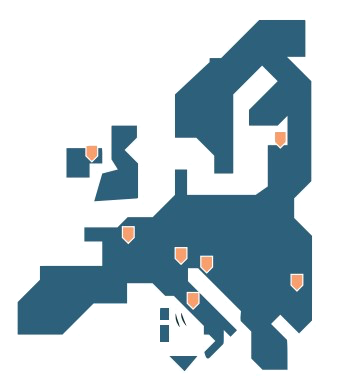Open data in Italy, Austria, Estonia, France, Ireland, Romania and Slovenia
| Sito: | Mooc |
| Corso: | M.o.o.c. Woodie - Whistleblower & Open Data |
| Libro: | Open data in Italy, Austria, Estonia, France, Ireland, Romania and Slovenia |
| Stampato da: | Utente ospite |
| Data: | lunedì, 8 dicembre 2025, 23:24 |
1. Introduction
 The subject of this report is the comparative analysis
of the open data policy and its implementation, with a
focus on public procurement in seven Member States
(MS) of the EU: Italy, Austria, Estonia, France, Ireland,
Romania and Slovenia.
The subject of this report is the comparative analysis
of the open data policy and its implementation, with a
focus on public procurement in seven Member States
(MS) of the EU: Italy, Austria, Estonia, France, Ireland,
Romania and Slovenia. At the EU level, there is the Directive on open data and the re-use of public sector information, (Directive (EU) 2019/1024), which entered into force on 16 July 2019 and must be transposed by the Member States by 16 July 2021. However, notwithstanding the Directive on public procurement, the issue of procurement openness is not found under a common EU legal/policy umbrella.
2. Definition and context
 In general, open data is not defined by law.
In general, open data is not defined by law. However, three key elements identify open data across countries: free access and availability, free-of-charge data re-use, and the publication of data being in the public interest.
In Italy there is a legal definition which refers to the characteristics of the data.
Accordingly, open data are data having the following characteristics:
- they are available under the terms of a licence or a regulatory provision, allowing them to be used by anyone, even for commercial purposes, in disaggregated format;
- they are accessible through information and communication technologies, including public and private data networks, in open forms, suitable for automatic use by computer programmes and provided with the relevant metadata;
- they are made available free of charge through information and communication technologies, including public and private telematic networks, or they are made available with marginal costs incurred for their reproduction and dissemination.
The rationale of open data is related to the transparency and accountability of the public administration.
The justification is, therefore, much broader than merely the fight against corruption. However, as highlighted in the most recent Communication from the Commission on Public Procurement in Europe: “the digital transformation, the growing wealth of data in general and the availability of open data standards offer opportunities to create better analytics for needs driven policy-making and warning systems to signal and tackle corruption in public procurement".
3. Laws and policies
Among the studied countries, Slovenia is the youngest democracy and the only one with the right to information of public nature enshrined in its Constitution.
On the opposite side, there is Austria, whose 1922 Constitution still includes amtsgeheimnis (official secrecy) protecting administrative and government information from disclosure.
This polarisation is further confirmation that the openness of the public administration is a principle which is still in its infancy and, in general, open data as a principle has come across strong resistance by the public administration itself until very recently, and is today facing the challenge of its full implementation.
Aside from Austria, all countries (some more explicitly, i.e. France, Italy and Estonia) have opted for the principle of open data by default and enacted a Freedom of Information Act. Estonia and Romania are the forerunners, given that their Freedom of Information legislation dates back to the beginning of the century.
Earlier or later, all of the
studied Member States joined the Open Government
Partnership (OGP), except for Austria and Slovenia.
Italy and France have specific rules to provide open data on public procurement.
In Italy, most of the provisions are found in the anti-corruption and transparency
laws, while the regulations in France are found in the
Public Procurement Code.
4. Areas of disclosure
The open data by default principle does not mean that public entities voluntarily disclose all data.
The information must be open to access, but not all information has to be published without request.
For example, Slovenia requires all public entities to publish on the website a catalogue of public information. Ireland does not define a list of information that has to be published but encourages the publication of all data on the national data portal.
Estonia has a comprehensive definition of public information: information recorded and documented in any manner and on any medium, obtained or created upon the performance of public duties. However, this does not provide an obligation to publish all public information.
Data must be published on public administration websites in Romania, Estonia, Slovenia, France, and Italy. In addition, Romanian and Slovenian legislation requires the publication of data on the national data portal. To avoid excessive fragmentation over thousands of public websites, Italy has also arranged for data to be published in national themed databases which are managed by different branches of the public administration or authorities. The link between these databases and the Italian national data portal is still unclear.
The same risk of dispersal is found in France. For public procurement data, the Directorate General of Public Finance (DGFiP) has proposed that the local authorities automatically “feedback” the essential data to a government department which will then automatically publish this data on the national open data portal.
Ireland requires publication on the national data portal but not on the websites of each public administration.
Although, in Austria, there is no right to information, some data are provided to the public. Cooperation OGD Österreich has implemented a platform where data – provided by cities (Vienna, Linz, Graz, Salzburg) and the Bundeskanzleramt (Chancellor’s Office) – is coordinated and forwarded to the European Data Portal.
Italy and France define by law what is subject to mandatory publication. In Italy, public entities have a general duty to publish data on: the organisation and activity of the public administrations; the use of public resources; the performance offered and the services provided by the public administration; on particular sectors. Conversely, France defines the obligation to publish taking into consideration the size of the public administration, focusing on the practical feasibility of the obligation, which is completely absent in the Italian system.
Every country, except Austria, is subject to the obligation to disclose upon request.The national FOIAs define the exceptions provided to protect legally relevant interests, such as national security, public order, criminal investigations, regular performance of inspection activities and personal data protection. Interestingly, Slovenia and France have the obligation to disclose online upon request, making the information, once requested, publicly available to everybody.
In terms of public procurement, the publication of information on the awarded contracts is guaranteed in all
countries. Estonia, Romania, Italy, and France have specific rules that oblige to publish most or all the administrative acts enacted in a public procurement procedure
(such as contract notices, contract information, names
and CVs of the appointed member of the selection committee, selection committee’s decisions, etc.).
Italy legally defines the publication obligations concerning public procurements, requiring public administrations and contracting authorities to publish on their institutional websites, in the “Transparent Administration” section, “Call for Tender and Contracts” sub-section, the following information:
- contracting authority;
- subject of the invitation to tender;
- list of operators invited to submit tenders;
- winning contractor;
- amount of the award;
- time needed to complete the work, service or supply;
- amount of sums paid;
- all deeds of the contracting authorities/entities, if not considered significant or secret, relating to:
- planning of works, services, and supplies;
- procedures for entrusting public contracts of services, supplies and works, of public design competitions, contests of ideas and concessions, including
those between entities in the public sector framework as indicated in Article 5;
- composition of the selection committee and the curricula of its members.
- transcripts of the financial management of the contracts, once the execution has ended.
5. Data standard
Data standardisation is central to facilitating the processing and analysis of data.
Unfortunately, stand ardised data is not yet an obligation in all Member States
and for all documents.
ardised data is not yet an obligation in all Member States
and for all documents.
The legislation in Romania and Italy does not lay down a legal obligation to standardise. In Italy, there is a general obligation to guarantee the quality of information and some operational suggestions to make the data easy to consult (e.g. the presentation in table format is suggested). At the same time, Romanian legislation recommends publishing in a standard format.
In Slovenia, the obligation to publish in the best available open data format is envisaged except when this
requires a “disproportionate effort beyond a standard
procedure” and in Estonia “only when it is possible and
appropriate.”
6. Personal data protection
 All of the studied Member States envisage the protection of personal data via anonymisation or restriction
on use.
All of the studied Member States envisage the protection of personal data via anonymisation or restriction
on use. The legislations have recently been amended to comply with the General Data Protection Regulation (GDPR).
The obligation to publish and its limitations are contained in different legal texts and the legal framework appears to be quite complex. It will take more time to evaluate if open data and personal data protection are correctly balanced across the countries.
However, data protection must not be
identified as an obstacle to the openness of the public
administration.
7. Supervisory authority
All of the Member States, except Austria, have some bodies with coordination duties, but their role varies across the countries.
France, Ireland, and Italy have national authorities (the Department of Public Expenditure and Reform in Ireland and, the Digital Agency for Italy and the General Data Administrator in France) that design the open data strategy, govern it, are responsible for OGP and somehow support the implementation of open data within their countries.
However, none of the MS have a fully-fledged open data authority which supervises and guarantees compliance with open data standards.
France, Estonia and Slovenia have authorities which supervise and control access to public documents (the Data Protection Inspectorate in Estonia, the Information Commissioner in Slovenia, the Commission for Access to Administrative Documents in France).
In Italy and Romania, open data also falls within the framework of the fight against corruption.
In Italy, the
National Anti-Corruption Agency controls the obligation related to transparency and access to documents.
In Romania, the National anticorruption Department
does not have any control function. In addition, there is
the General Secretariat of the Government in Romania,
an authority that promotes and coordinates the adoption of open data policies, but without power to guarantee compliance.
With regard to supervision on the openness of public procurement data, the authorities are only the same in Italy and Romania, due to the partial inclusion of open data in the anti-corruption strategy.
In Ireland, there is almost no interaction between the public procurement office and governance of the open data portal.
In France, the Directorate of Legal Affairs coordinates
and supervises the ambitious Digital Transformation
Plan for public procurement which includes, among
many other aspects, the openness of public procurement.
8. Sanctions
 The provision of sanctions is quite varied between the
Member States.
The provision of sanctions is quite varied between the
Member States. In Austria, the disclosure of open data is not compulsory but is a voluntary action of the public administration; therefore, there are no provisions for sanctions or even rewards.
Ireland and France do have compulsory publication but
do not apply any sanction for breaching the publication obligation.
Italy, Romania, Slovenia and Estonia do apply sanctions.
They are mainly administrative sanctions imposed for not having published or disclosed information as required.
In Estonia, if a holder of public information does not comply with the provisions on access to open data or fails to answer promptly any requests for information, the Data Protection Inspectorate may issue a warning and may issue precepts, proposals, and recommendations.
A sanction may only be issued if no action is taken by the public administration.
In Romania and Italy, the power to sanction is related to the anti-corruption framework and is not seen
as sanctioning the breach of open data policies in itself.
9. Implementation at national and local level
The implementation of open data at public administration level is still weak.
Even in countries that are committed to open data, a gap between intentions, declarations and implementation is evident.
The interviews carried out with public administrations reveal the lack of common implementation within each Member State and the need for better monitoring.
The most significant difficulties are similar across the countries:
- lack of technical infrastructure
- challenges in terms of data quality
- misaligned organisational priorities
- lack of expertise among public officers.
It is focused on boosting transparency as an anti-corruption measure in Romania and Italy, while other countries see open data as a vehicle for enhancing economic growth.
This dual nature of open data emerged when comparing the legal frameworks but it became crystal clear when looking at its implementation. In all of the examined countries, the public administrations seem to follow their own agendas in implementing the rules; no central monitoring is currently fully in place to standardise the practice.
In general, public administrations do not have internal
guidelines for implementing open data policies.
The lack of internal guidelines means that data published by public administrations are not uniform, the publication follows different procedures and there is no standard policy in term of publication format.
The
identity of the person responsible for publishing data
is also unclear, except in France and Ireland, which have
a more centralised system. Italy and Romania do have a
person responsible for publishing data connected with
anti-corruption policies, but this does not materialise in
at least a common standard across public administrations. The biggest issue is data cleanliness and quality:
data remains rather difficult for citizens to use.
In all of the examined countries, officers are trained to handle access requests, but they do not receive any specific training on open data. In particular, there is alack of training on the rationale behind open data; data are published because there is a duty to do so, with no clear perspective on the requirements of users.
As already anticipated, Italy, France, and Romania are required to publish all data on public tender procedures. In France, the obligation to publish a minimum set of data with a defined standard is too new to facilitate its evaluation in terms of implementation. In Italy, data are published according to anti-corruption policies that do not establish data standards. Only a summary table of the contracts awarded is published as a defined open format, but this occurs once a year. In Romania, the SICAP platform is designed to allow national authorities to check procurement, but it is not designed as a tool for enhancing transparency towards citizens (e.g. data are not downloadable in machine-readable format).
The connection between datasets published on the public administration websites or unpublished but available and the national data portal does not respond to standard rules. Many datasets are published and updated individually by public administrations, others are harvested daily from existing data catalogues; others are not transferred. In Italy, in particular, the proliferation of databases makes it unclear which data can be found and where. Data audits only seem to be in place in Ireland.
By now, in Italy, Romania, Slovenia and Estonia, public administrations respond to data requests but they are not proactive. When it is mandatory, data are published, but with a lack of foresight in terms of their usability. Some public administrations (e.g. that of the city of Milan in Italy) have started to be more proactive. Having learned by data requests that some data receive more attention from citizens, officers have started to consider proactively publishing this data, to respond to the interests of citizens and to reduce the number of access requests.